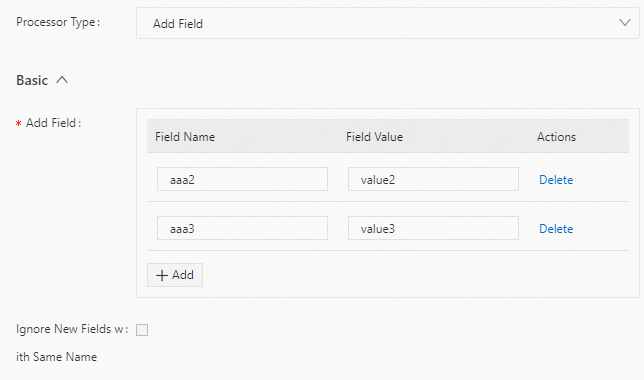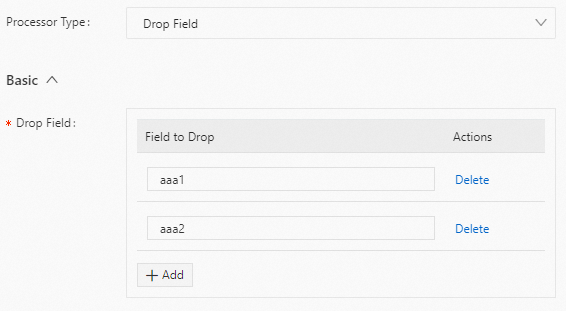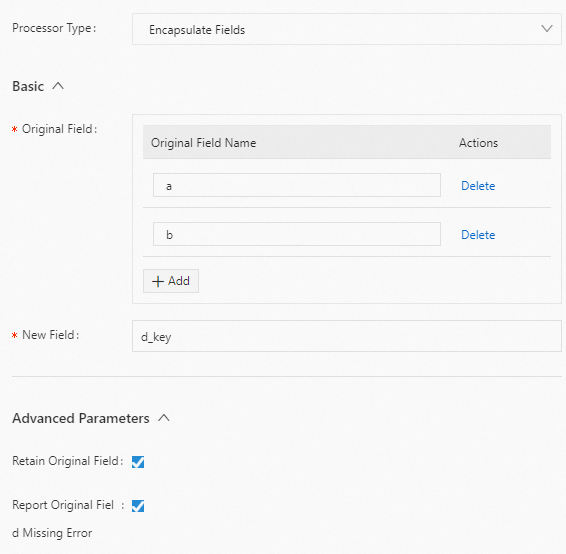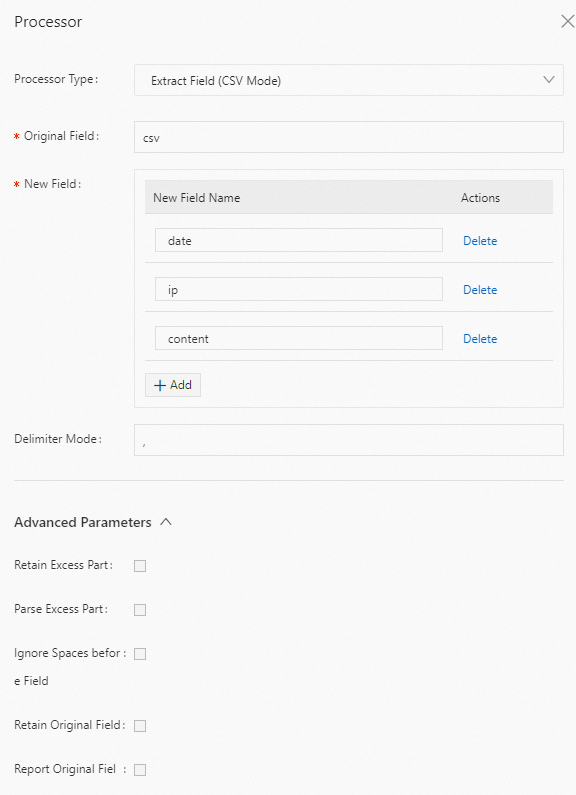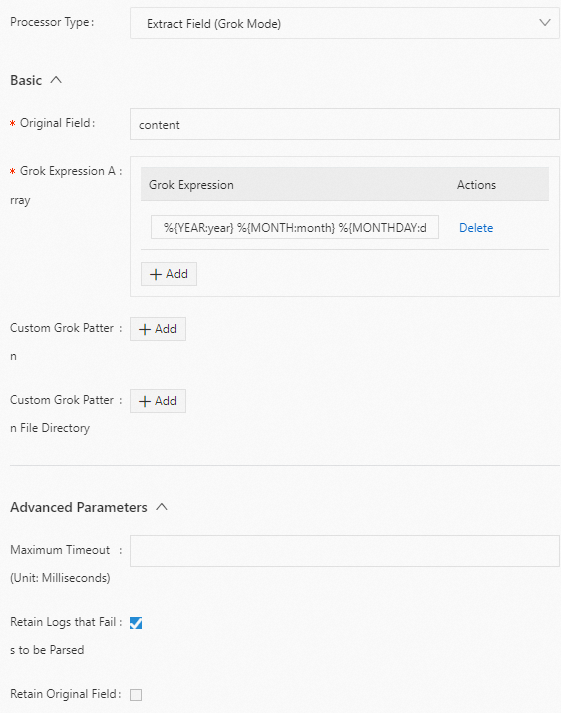Field processing plugins are used to add, delete, modify, pack, expand, and extract fields.
Example of field processing
The following table shows the data structure of a raw log after it is saved to Simple Log Service (SLS). The table compares the results of using the field extraction plugin in anchor mode with the results of not using a plugin. Using an extraction plugin structures your data, which makes subsequent queries easier.
Raw log | Without a field processing plugin | Using the field extraction plugin in anchor mode |
"time:2022.09.12 20:55:36\t json:{\"key1\" : \"xx\", \"key2\": false, \"key3\":123.456, \"key4\" : { \"inner1\" : 1, \"inner2\" : false}}"
| Content: "time:2022.09.12 20:55:36\t json:{\"key1\" : \"xx\", \"key2\": false, \"key3\":123.456, \"key4\" : { \"inner1\" : 1, \"inner2\" : false}}" | Field values are extracted in anchor mode. The field names are set to time, val_key1, val_key2, val_key3, value_key4_inner1, and value_key4_inner2. "time" : "2022.09.12 20:55:36"
"val_key1" : "xx"
"val_key2" : "false"
"val_key3" : "123.456"
"value_key4_inner1" : "1"
"value_key4_inner2" : "false"
|
Overview of field processing plugins
SLS provides the following types of field processing plugins.
Plugin | Type | Description |
Extract fields | Extended | Supports the following modes: Regex mode: Extracts fields using regular expression matching. Anchor mode: Extracts fields by position or marker. CSV mode: Extracts fields in CSV format. Single-character delimiter mode: Extracts fields using a single-character delimiter. Multi-character delimiter mode: Extracts fields using a Multi-character Delimiter. Key-value pair mode: Extracts fields from a key-value pair format. Grok mode: Extracts structured fields using Grok syntax.
|
|
|
|
|
|
|
Add fields | Extended | Adds new fields to a log. |
Drop fields | Extended | Deletes specified fields. |
Rename fields | Extended | Changes field names. |
Pack fields | Extended | Packs multiple fields into a single JSON object. |
Expand JSON fields | Extended | Expands a JSON string field into separate fields. |
Map field values | Extended | Replaces or transforms field values based on a mapping table. |
Replace strings | Extended | Performs full-text replacement, regular expression-based replacement, or escape character removal for text logs. |
Entry point
To use a Logtail plugin for log processing, add it when you create or modify a Logtail configuration. For more information, see Overview.
Limits
Text logs and container standard output support only the form-based configuration. Other input sources support only the JSON configuration.
The following limits apply when you extract fields in regex mode.
The Go regular expression engine is based on RE2. Compared to the PCRE engine, it has the following limitations:
Differences in named group syntax
Go uses the (?P<name>...) syntax, not the (?<name>...) syntax used by PCRE.
Unsupported regular expression patterns
Assertions: (?=...), (?!...), (?<=...), (?<!...).
Conditional expressions: (?(condition)true|false).
Recursive matching: (?R), (?0).
Subroutine references: (?&name), (?P>name).
Atomic groups: (?>...).
When you debug regular expressions with tools such as Regex101, avoid the unsupported patterns listed above. Otherwise, the plugin cannot process the logs.
Extract fields plugin
Extracts log fields in regex mode, anchor mode, CSV mode, single-character delimiter mode, Multi-character Delimiter mode, key-value pair mode, or Grok mode.
Regex mode
Extracts target fields using a regular expression.
Form-based configuration
Parameters
Set Processor Type to Extract Field (Regex Mode). The following table describes the parameters.
Parameter | Description |
Original Field | The name of the source field. |
Regular Expression | The regular expression. Use parentheses () to mark the fields to be extracted. |
New Field | The names for the extracted content. You can add multiple field names. |
Report Original Field Missing Error | If you select this option, an error is reported if the source field is not found in the raw log. |
Report Regex Mismatch Error | If you select this option, an error is reported if the regular expression does not match the value of the source field. |
Retain Original Field | If you select this option, the source field is kept in the parsed log. |
Retain Original Field If Parsing Fails | If you select this option, the source field is kept in the parsed log if parsing fails. |
Full Regex Match | If you select this option, field values are extracted only if all fields set in New Field match the source field value based on the specified regular expression. |
Example
Extract the value of the content field in regex mode and set the field names to ip, time, method, url, request_time, request_length, status, length, ref_url, and browser. The following is an example configuration:
Raw log
"content" : "10.200.**.** - - [10/Aug/2022:14:57:51 +0800] \"POST /PutData?
Category=YunOsAccountOpLog&AccessKeyId=<yourAccessKeyId>&Date=Fri%2C%2028%20Jun%202013%2006%3A53%3A30%20GMT&Topic=raw&Signature=<yourSignature> HTTP/1.1\" 0.024 18204 200 37 \"-\" \"aliyun-sdk-java"
Logtail plugin configuration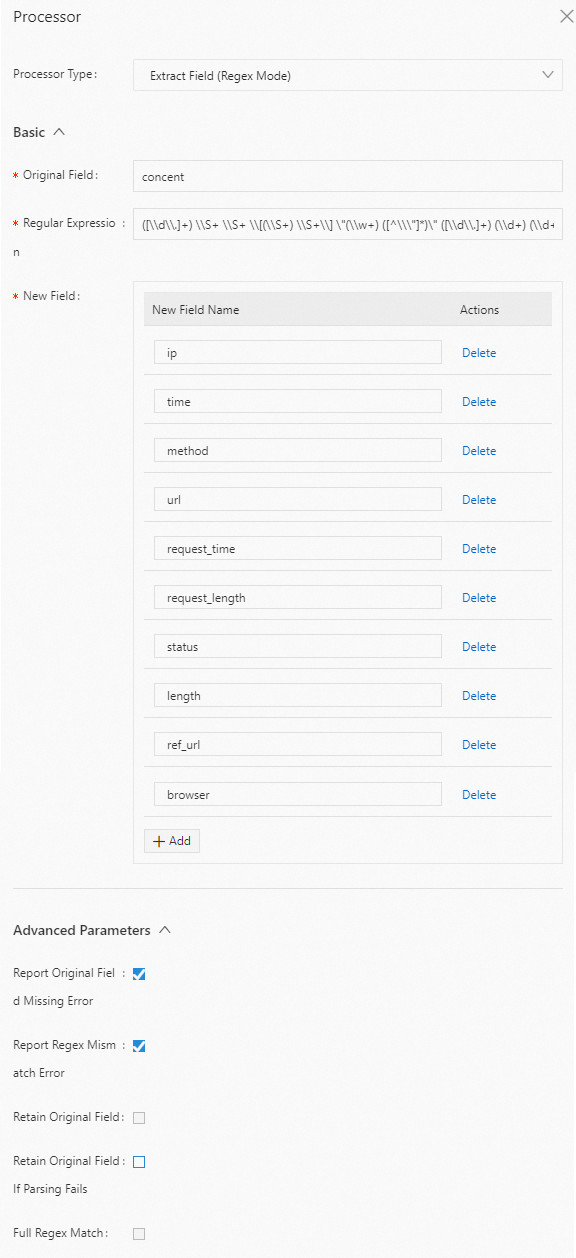
Result
"ip" : "10.200.**.**"
"time" : "10/Aug/2022:14:57:51"
"method" : "POST"
"url" : "/PutData?Category=YunOsAccountOpLog&AccessKeyId=<yourAccessKeyId>&Date=Fri%2C%2028%20Jun%202013%2006%3A53%3A30%20GMT&Topic=raw&Signature=<yourSignature>"
"request_time" : "0.024"
"request_length" : "18204"
"status" : "200"
"length" : "27"
"ref_url" : "-"
"browser" : "aliyun-sdk-java"
JSON configuration
Parameters
Set type to processor_regex. The following table describes the parameters in detail.
Parameter | Type | Required | Description |
SourceKey | String | Yes | The name of the source field. |
Regex | String | Yes | The regular expression. Use parentheses () to mark the fields to be extracted. |
Keys | String array | Yes | The names for the extracted content. Example: ["ip", "time", "method"]. |
NoKeyError | Boolean | No | Specifies whether to report an error if the source field is not found in the raw log. |
NoMatchError | Boolean | No | Specifies whether to report an error if the regular expression does not match the value of the source field. |
KeepSource | Boolean | No | Specifies whether to keep the source field in the parsed log. |
FullMatch | Boolean | No | Specifies whether to extract field values only when a full match is found. true (default): Field values are extracted only if all fields that you set in the Keys parameter match the value of the source field based on the regular expression in the Regex parameter. false: Field values are extracted even if only a partial match is found.
|
KeepSourceIfParseError | Boolean | No | Specifies whether to keep the source field in the parsed log if parsing fails. |
Example
Extract the value of the content field in regex mode and set the field names to ip, time, method, url, request_time, request_length, status, length, ref_url, and browser. The following is an example configuration:
Raw log
"content" : "10.200.**.** - - [10/Aug/2022:14:57:51 +0800] \"POST /PutData?
Category=YunOsAccountOpLog&AccessKeyId=<yourAccessKeyId>&Date=Fri%2C%2028%20Jun%202013%2006%3A53%3A30%20GMT&Topic=raw&Signature=<yourSignature> HTTP/1.1\" 0.024 18204 200 37 \"-\" \"aliyun-sdk-java"
Logtail plugin configuration
{
"type" : "processor_regex",
"detail" : {"SourceKey" : "content",
"Regex" : "([\\d\\.]+) \\S+ \\S+ \\[(\\S+) \\S+\\] \"(\\w+) ([^\\\"]*)\" ([\\d\\.]+) (\\d+) (\\d+) (\\d+|-) \"([^\\\"]*)\" \"([^\\\"]*)\" (\\d+)",
"Keys" : ["ip", "time", "method", "url", "request_time", "request_length", "status", "length", "ref_url", "browser"],
"NoKeyError" : true,
"NoMatchError" : true,
"KeepSource" : false
}
}
Result
"ip" : "10.200.**.**"
"time" : "10/Aug/2022:14:57:51"
"method" : "POST"
"url" : "/PutData?Category=YunOsAccountOpLog&AccessKeyId=<yourAccessKeyId>&Date=Fri%2C%2028%20Jun%202013%2006%3A53%3A30%20GMT&Topic=raw&Signature=<yourSignature>"
"request_time" : "0.024"
"request_length" : "18204"
"status" : "200"
"length" : "27"
"ref_url" : "-"
"browser" : "aliyun-sdk-java"
Anchor mode
Extracts fields by specifying start and end keywords. If the field is in JSON format, you can expand it.
Form-based configuration
Parameters
Set Processor Type to Extract Field (Anchor Mode). The following table describes the parameters.
Parameter | Description |
Original Field | The name of the source field. |
Anchor Parameters | List of anchor parameters. |
Start Keyword | The start keyword. If you leave this parameter empty, the match starts from the beginning of the string. |
End Keyword | The end keyword. If you leave this parameter empty, the match extends to the end of the string. |
New Field | The name for the extracted content. |
Field Type | The type of the field. Valid values are string and json. |
JSON Expansion | Specifies whether to expand the JSON field. |
Character to Concatenate Expanded Keys | The connector for JSON expansion. The default value is an underscore (_). |
Maximum Depth of JSON Expansion | The maximum depth for JSON expansion. The default value is 0, which means no limit. |
Report Original Field Missing Error | If you select this option, an error is reported if the source field is not found in the raw log. |
Report Keywords Missing Error | If you select this option, an error is reported if no matching delimited item is found in the raw log. |
Retain Original Field | If you select this option, the source field is kept in the parsed log. |
Example
Extract the value of the content field in anchor mode and set the field names to time, val_key1, val_key2, val_key3, value_key4_inner1, and value_key4_inner2. The following is an example configuration:
Raw log
"content" : "time:2022.09.12 20:55:36\t json:{\"key1\" : \"xx\", \"key2\": false, \"key3\":123.456, \"key4\" : { \"inner1\" : 1, \"inner2\" : false}}"
Logtail plugin configuration 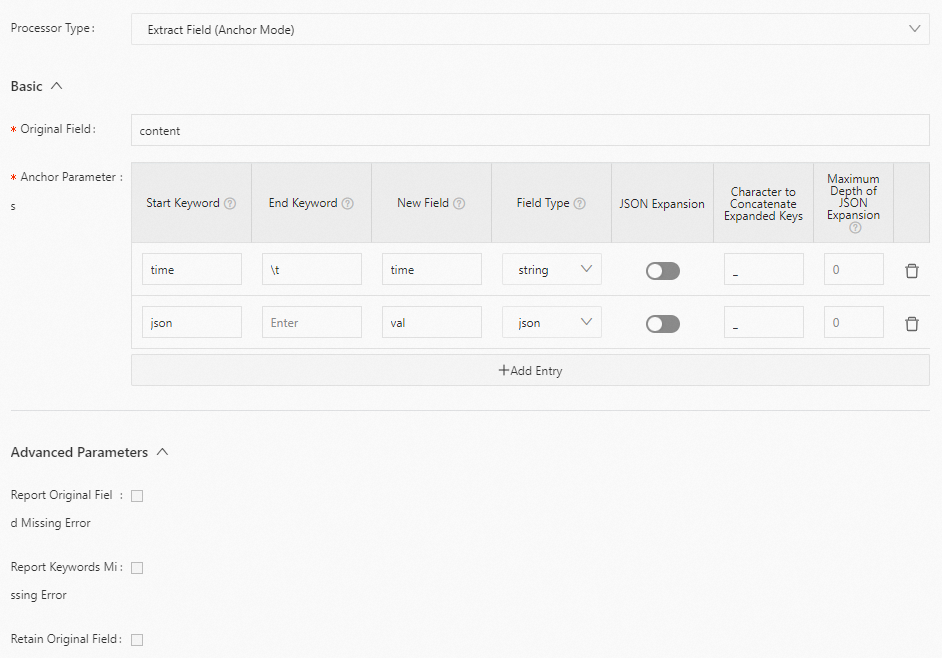
Result
"time" : "2022.09.12 20:55:36"
"val_key1" : "xx"
"val_key2" : "false"
"val_key3" : "123.456"
"value_key4_inner1" : "1"
"value_key4_inner2" : "false"
JSON configuration
Parameters
Set type to processor_anchor. The following table describes the parameters in detail.
Parameter | Type | Required | Description |
SourceKey | String | Yes | The name of the source field. |
Anchors | Anchor array | Yes | Calibration items. |
Start | String | Yes | The start keyword. If this is empty, it matches the beginning of the string. |
Stop | String | Yes | The end keyword. If this is empty, it matches the end of the string. |
FieldName | String | Yes | The name for the extracted content. |
FieldType | String | Yes | The type of the field. Valid values are string and json. |
ExpondJson | Boolean | No | Specifies whether to expand the JSON field. This parameter takes effect only when FieldType is set to json. |
ExpondConnecter | String | No | The connector for JSON expansion. The default value is an underscore (_). |
MaxExpondDepth | Int | No | The maximum depth for JSON expansion. The default value is 0, which means no limit. |
NoAnchorError | Boolean | No | Specifies whether to report an error if a delimited item is not found. |
NoKeyError | Boolean | No | Specifies whether to report an error if the source field is not found in the raw log. |
KeepSource | Boolean | No | Specifies whether to keep the source field in the parsed log. |
Example
Extract the value of the content field in anchor mode and set the field names to time, val_key1, val_key2, val_key3, value_key4_inner1, and value_key4_inner2. The following is an example configuration:
Raw log
"content" : "time:2022.09.12 20:55:36\t json:{\"key1\" : \"xx\", \"key2\": false, \"key3\":123.456, \"key4\" : { \"inner1\" : 1, \"inner2\" : false}}"
Logtail plugin configuration
{
"type" : "processor_anchor",
"detail" : {"SourceKey" : "content",
"Anchors" : [
{
"Start" : "time",
"Stop" : "\t",
"FieldName" : "time",
"FieldType" : "string",
"ExpondJson" : false
},
{
"Start" : "json:",
"Stop" : "",
"FieldName" : "val",
"FieldType" : "json",
"ExpondJson" : true
}
]
}
}
Result
"time" : "2022.09.12 20:55:36"
"val_key1" : "xx"
"val_key2" : "false"
"val_key3" : "123.456"
"value_key4_inner1" : "1"
"value_key4_inner2" : "false"
CSV mode
Parses logs in CSV format.
Single-character delimiter mode
Note Extracts fields using a single-character delimiter. This mode supports using a quote character to enclose fields that contain the separator.
Form-based configuration
Parameters
Set Processor Type to Extract Field (Single-character Delimiter Mode). The following table describes the parameters.
Parameter | Description |
Original Field | The name of the source field. |
Delimiter | The separator. It must be a single character. You can set it to a non-printable character, such as \u0001. |
New Field | The names for the extracted content. |
Use Quote | Specifies whether to use a quote character. |
Quote | The quote character. It must be a single character. You can set it to a non-printable character, such as \u0001. |
Report Original Field Missing Error | If you select this option, an error is reported if the source field is not found in the raw log. |
Report Delimiter Mismatch Error | If you select this option, an error is reported if the log cannot be split by the specified separator. |
Retain Original Field | If you select this option, the source field is kept in the parsed log. |
Example
Extract the value of the content field using a vertical bar (|) as the separator and set the field names to ip, time, method, url, request_time, request_length, status, length, ref_url, and browser. The following is an example configuration:
Raw log
"content" : "10.**.**.**|10/Aug/2022:14:57:51 +0800|POST|PutData?
Category=YunOsAccountOpLog&AccessKeyId=<yourAccessKeyId>&Date=Fri%2C%2028%20Jun%202013%2006%3A53%3A30%20GMT&Topic=raw&Signature=<yourSignature>|0.024|18204|200|37|-|
aliyun-sdk-java"
Logtail plugin configuration 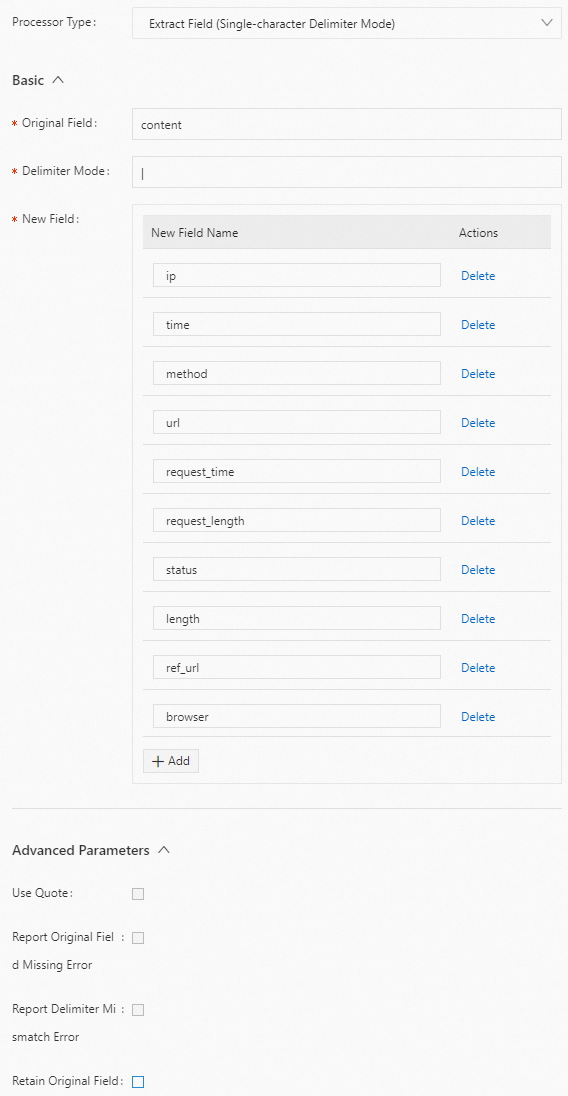
Result
"ip" : "10.**.**.**"
"time" : "10/Aug/2022:14:57:51 +0800"
"method" : "POST"
"url" : "/PutData?Category=YunOsAccountOpLog&AccessKeyId=<yourAccessKeyId>&Date=Fri%2C%2028%20Jun%202013%2006%3A53%3A30%20GMT&Topic=raw&Signature=<yourSignature>"
"request_time" : "0.024"
"request_length" : "18204"
"status" : "200"
"length" : "27"
"ref_url" : "-"
"browser" : "aliyun-sdk-java"
JSON configuration
Parameters
Set type to processor_split_char. The following table describes the parameters in detail.
Parameter | Type | Required | Description |
SourceKey | String | Yes | The name of the source field. |
SplitSep | String | Yes | The separator. It must be a single character. You can set it to a non-printable character, such as \u0001. |
SplitKeys | String array | Yes | The names for the extracted content. Example: ["ip", "time", "method"]. |
PreserveOthers | Boolean | No | Specifies whether to keep the remaining part if the number of fields to be split is larger than the number of fields in the SplitKeys parameter. |
QuoteFlag | Boolean | No | Specifies whether to use a quote character. |
Quote | String | No | The quote character. It must be a single character. You can set it to a non-printable character, such as \u0001. This parameter takes effect only when QuoteFlag is set to true. |
NoKeyError | Boolean | No | Specifies whether to report an error if the source field is not found in the raw log. |
NoMatchError | Boolean | No | Specifies whether to report an error if the specified separator does not match the separator in the log. |
KeepSource | Boolean | No | Specifies whether to keep the source field in the parsed log. |
Example
Extract the value of the content field using a vertical bar (|) as the separator and set the field names to ip, time, method, url, request_time, request_length, status, length, ref_url, and browser. The following is an example configuration:
Raw log
"content" : "10.**.**.**|10/Aug/2022:14:57:51 +0800|POST|PutData?
Category=YunOsAccountOpLog&AccessKeyId=<yourAccessKeyId>&Date=Fri%2C%2028%20Jun%202013%2006%3A53%3A30%20GMT&Topic=raw&Signature=<yourSignature>|0.024|18204|200|37|-|
aliyun-sdk-java"
Logtail plugin configuration
{
"type" : "processor_split_char",
"detail" : {"SourceKey" : "content",
"SplitSep" : "|",
"SplitKeys" : ["ip", "time", "method", "url", "request_time", "request_length", "status", "length", "ref_url", "browser"]
}
}
Result
"ip" : "10.**.**.**"
"time" : "10/Aug/2022:14:57:51 +0800"
"method" : "POST"
"url" : "/PutData?Category=YunOsAccountOpLog&AccessKeyId=<yourAccessKeyId>&Date=Fri%2C%2028%20Jun%202013%2006%3A53%3A30%20GMT&Topic=raw&Signature=<yourSignature>"
"request_time" : "0.024"
"request_length" : "18204"
"status" : "200"
"length" : "27"
"ref_url" : "-"
"browser" : "aliyun-sdk-java"
Multi-character Delimiter mode
Note Extracts fields using a Multi-character Delimiter. This mode does not support using a quote character to enclose fields.
Form-based configuration
Parameters
Set Processor Type to Extract Field (Multi-character Delimiter Mode). The following table describes the parameters.
Parameter | Description |
Original Field | The name of the source field. |
Delimiter String | The separator. You can set it to a non-printable character, such as \u0001\u0002. |
New Field | The names for the extracted log content.
Important If splitting the log produces fewer fields than the number of fields specified in New Field, the extra field names in New Field are ignored. |
Report Original Field Missing Error | If you select this option, an error is reported if the source field is not found in the log. |
Report Delimiter Mismatch Error | If you select this option, an error is reported if the log cannot be split by the specified separator. |
Retain Original Field | If you select this option, the source field is kept in the parsed log. |
Retain Excess Part | If you select this option, the system keeps the remaining content if splitting the log produces more fields than the number of fields specified in New Field. |
Parse Excess Part | If you select this option, the system parses the remaining content if splitting the log produces more fields than the number of fields in New Field. Use Name Prefix of Field to which Excess Part is Assigned to specify the prefix for the names of the remaining fields. |
Name Prefix of Field to which Excess Part is Assigned | The prefix for the names of the remaining fields. For example, if you set this to expand_, the field names are expand_1, expand_2, and so on. |
Example
Extract the value of the content field using the separator |#| and set the field names to ip, time, method, url, request_time, request_length, status, expand_1, expand_2, and expand_3. The following is an example configuration:
Raw log
"content" : "10.**.**.**|#|10/Aug/2022:14:57:51 +0800|#|POST|#|PutData?
Category=YunOsAccountOpLog&AccessKeyId=<yourAccessKeyId>&Date=Fri%2C%2028%20Jun%202013%2006%3A53%3A30%20GMT&Topic=raw&Signature=<yourSignature>|#|0.024|#|18204|#|200|#|27|#|-|#|
aliyun-sdk-java"
Logtail plugin configuration 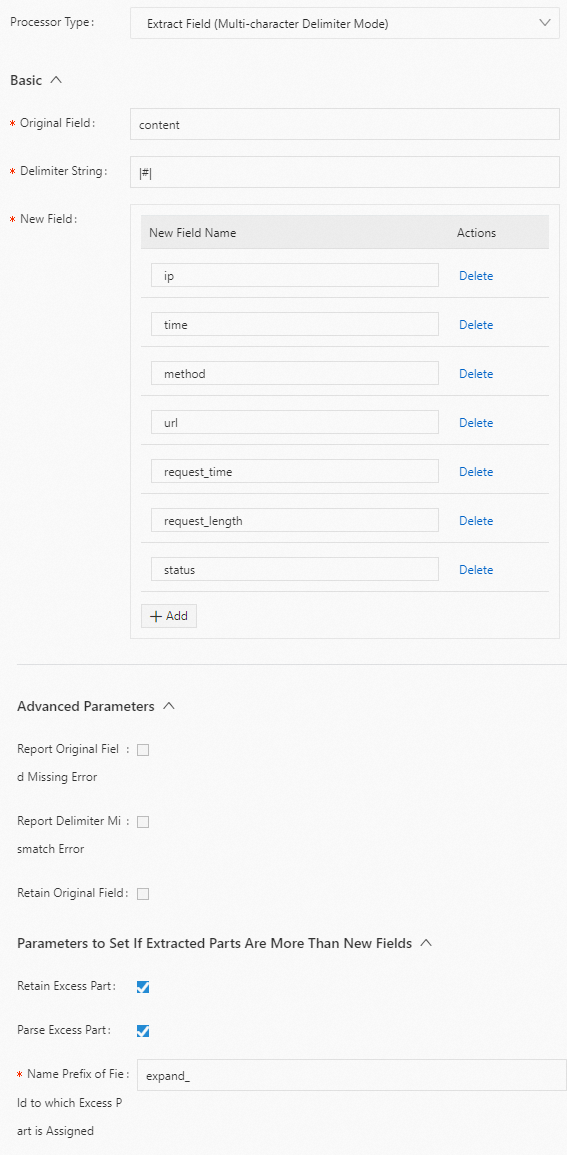
Result
"ip" : "10.**.**.**"
"time" : "10/Aug/2022:14:57:51 +0800"
"method" : "POST"
"url" : "/PutData?Category=YunOsAccountOpLog&AccessKeyId=<yourAccessKeyId>&Date=Fri%2C%2028%20Jun%202013%2006%3A53%3A30%20GMT&Topic=raw&Signature=<yourSignature>"
"request_time" : "0.024"
"request_length" : "18204"
"status" : "200"
"expand_1" : "27"
"expand_2" : "-"
"expand_3" : "aliyun-sdk-java"
JSON configuration
Parameters
Set type to processor_split_string. The following table describes the parameters in detail.
Parameter | Type | Required | Description |
SourceKey | String | Yes | The name of the source field. |
SplitSep | String | Yes | The separator. You can set it to a non-printable character, such as \u0001\u0002. |
SplitKeys | String array | Yes | The names for the extracted log content. Example: ["key1","key2"].
Note If the number of fields to be split is smaller than the number of fields in the SplitKeys parameter, the extra fields in the SplitKeys parameter are ignored. |
PreserveOthers | Boolean | No | Specifies whether to keep the remaining part if the number of fields to be split is larger than the number of fields in the SplitKeys parameter. |
ExpandOthers | Boolean | No | Specifies whether to parse the remaining part if the number of fields to be split is larger than the number of fields in the SplitKeys parameter. true: Parse the remaining part. Use the ExpandOthers parameter to parse the remaining part and the ExpandKeyPrefix parameter to specify the prefix for the names of the remaining fields. false (default): Do not parse the remaining part.
|
ExpandKeyPrefix | String | No | The prefix for the names of the remaining fields. For example, if you set this to expand_, the field names are expand_1, expand_2, and so on. |
NoKeyError | Boolean | No | Specifies whether to report an error if the source field is not found in the raw log. |
NoMatchError | Boolean | No | Specifies whether to report an error if the specified separator does not match the separator in the log. |
KeepSource | Boolean | No | Specifies whether to keep the source field in the parsed log. |
Example
Extract the value of the content field using the separator |#| and set the field names to ip, time, method, url, request_time, request_length, status, expand_1, expand_2, and expand_3. The following is an example configuration:
Raw log
"content" : "10.**.**.**|#|10/Aug/2022:14:57:51 +0800|#|POST|#|PutData?
Category=YunOsAccountOpLog&AccessKeyId=<yourAccessKeyId>&Date=Fri%2C%2028%20Jun%202013%2006%3A53%3A30%20GMT&Topic=raw&Signature=<yourSignature>|#|0.024|#|18204|#|200|#|27|#|-|#|
aliyun-sdk-java"
Logtail plugin configuration
{
"type" : "processor_split_string",
"detail" : {"SourceKey" : "content",
"SplitSep" : "|#|",
"SplitKeys" : ["ip", "time", "method", "url", "request_time", "request_length", "status"],
"PreserveOthers" : true,
"ExpandOthers" : true,
"ExpandKeyPrefix" : "expand_"
}
}
Result
"ip" : "10.**.**.**"
"time" : "10/Aug/2022:14:57:51 +0800"
"method" : "POST"
"url" : "/PutData?Category=YunOsAccountOpLog&AccessKeyId=<yourAccessKeyId>&Date=Fri%2C%2028%20Jun%202013%2006%3A53%3A30%20GMT&Topic=raw&Signature=<yourSignature>"
"request_time" : "0.024"
"request_length" : "18204"
"status" : "200"
"expand_1" : "27"
"expand_2" : "-"
"expand_3" : "aliyun-sdk-java"
Key-value pair mode
Extracts fields by splitting key-value pairs.
Note The processor_split_key_value plugin is supported in Logtail 0.16.26 and later.
Form-based configuration
Parameters
Set Processor Type to Extract Field (Key-value Pair Mode). The following table describes the parameters.
Parameter | Description |
Original Field | The name of the source field. |
Key-value Pair Delimiter | The separator between key-value pairs. The default value is a tab character \t. |
Key-value Delimiter | The separator between a key and a value in a key-value pair. The default value is a colon (:). |
Retain Original Field | If you select this option, the system keeps the source field. |
Report Original Field Missing Error | If you select this option, an error is reported if the source field is not found in the log. |
Drop Key-value Pairs That Fail to Match Delimiter | If you select this option, the system discards a key-value pair if it does not contain the specified key-value separator. |
Report Key and Value Delimiter Missing Error | If you select this option, an error is reported if a key-value pair does not contain the specified key-value separator. |
Report Empty Key Error | If you select this option, an error is reported if a key is empty after splitting. |
Quote | If a value is enclosed in quote characters, the value within the quote characters is extracted. You can set multiple characters.
Important If a backslash (\) is used to escape a quote character within a quoted value, the backslash (\) is retained as part of the value. |
Examples
Example 1: Split key-value pairs.
Split the value of the content field into key-value pairs. The separator between key-value pairs is a tab character \t, and the separator within a key-value pair is a colon (:). The following is an example configuration:
Raw log
"content": "class:main\tuserid:123456\tmethod:get\tmessage:\"wrong user\""
Logtail plugin configuration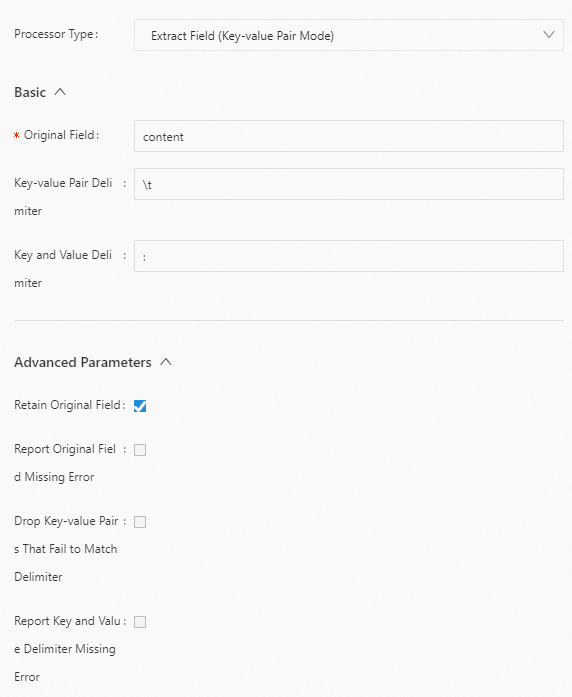
Result
"content": "class:main\tuserid:123456\tmethod:get\tmessage:\"wrong user\""
"class": "main"
"userid": "123456"
"method": "get"
"message": "\"wrong user\""
Example 2: Split key-value pairs that contain quote characters.
Split the value of the content field into key-value pairs. The separator between key-value pairs is a tab character \t, the separator within a key-value pair is a colon (:), and the quote character is a double quotation mark ("). The following is an example configuration:
Raw log
"content": "class:main http_user_agent:\"User Agent\" \"Chinese\" \"hello\\t\\\"ilogtail\\\"\\tworld\""
Logtail plugin configuration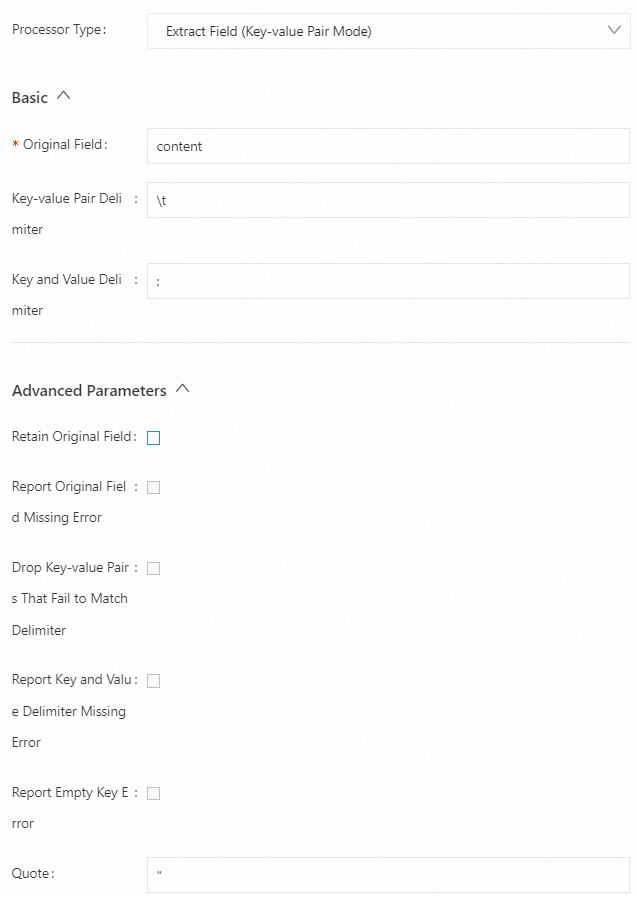
Result
"class": "main",
"http_user_agent": "User Agent",
"no_separator_key_0": "Chinese",
"no_separator_key_1": "hello\t\"ilogtail\"\tworld",
Example 3: Split key-value pairs that contain multi-character quote characters.
Split the value of the content field into key-value pairs. The separator between key-value pairs is a tab character \t, the separator within a key-value pair is a colon (:), and the quote character is a double quotation mark (""). The following is an example configuration:
Raw log
"content": "class:main http_user_agent:\"\"\"User Agent\"\"\" \"\"\"Chinese\"\"\""
Logtail plugin configuration
Result
"class": "main",
"http_user_agent": "User Agent",
"no_separator_key_0": "Chinese",
JSON configuration
Parameters
Set type to processor_split_key_value. The following table describes the parameters in detail.
Parameter | Type | Required | Description |
SourceKey | string | Yes | The name of the source field. |
Delimiter | string | No | The separator between key-value pairs. The default value is a tab character \t. |
Separator | string | No | The separator between a key and a value in a key-value pair. The default value is a colon (:). |
KeepSource | Boolean | No | Specifies whether to keep the source field in the parsed log. |
ErrIfSourceKeyNotFound | Boolean | No | Specifies whether to report an error if the source field is not found in the raw log. |
DiscardWhenSeparatorNotFound | Boolean | No | Specifies whether to discard the key-value pair if no matching separator is found. |
ErrIfSeparatorNotFound | Boolean | No | Specifies whether to report an error when the specified separator is not found. |
ErrIfKeyIsEmpty | Boolean | No | Specifies whether to report an error when a key is empty after splitting. |
Quote | String | No | The quote character. If this is set and a value is enclosed in quote characters, the value within the quote characters is extracted. You can set multiple characters. By default, the quote character feature is disabled.
Important If the quote character is a double quotation mark (""), you must add an escape character, which is a backslash (\). If a backslash (\) is used with a quote character within the quote characters, the backslash (\) is included as part of the value.
|
Examples
Example 1: Split key-value pairs.
Split the value of the content field into key-value pairs. The separator between key-value pairs is a tab character \t, and the separator within a key-value pair is a colon (:). The following is an example configuration:
Raw log
"content": "class:main\tuserid:123456\tmethod:get\tmessage:\"wrong user\""
Logtail plugin configuration
{
"processors":[
{
"type":"processor_split_key_value",
"detail": {
"SourceKey": "content",
"Delimiter": "\t",
"Separator": ":",
"KeepSource": true
}
}
]
}
Result
"content": "class:main\tuserid:123456\tmethod:get\tmessage:\"wrong user\""
"class": "main"
"userid": "123456"
"method": "get"
"message": "\"wrong user\""
Example 2: Split key-value pairs.
Split the value of the content field into key-value pairs. The separator between key-value pairs is a tab character \t, the separator within a key-value pair is a colon (:), and the quote character is a double quotation mark ("). The following is an example configuration:
Raw log
"content": "class:main http_user_agent:\"User Agent\" \"Chinese\" \"hello\\t\\\"ilogtail\\\"\\tworld\""
Logtail plugin configuration
{
"processors":[
{
"type":"processor_split_key_value",
"detail": {
"SourceKey": "content",
"Delimiter": " ",
"Separator": ":",
"Quote": "\""
}
}
]
}
Result
"class": "main",
"http_user_agent": "User Agent",
"no_separator_key_0": "Chinese",
"no_separator_key_1": "hello\t\"ilogtail\"\tworld",
Example 3: Split key-value pairs.
Split the value of the content field into key-value pairs. The separator between key-value pairs is a tab character \t, the separator within a key-value pair is a colon (:), and the quote character is a triple quotation mark ("""). The following is an example configuration:
Raw log
"content": "class:main http_user_agent:\"\"\"User Agent\"\"\" \"\"\"Chinese\"\"\""
Logtail plugin configuration
{
"processors":[
{
"type":"processor_split_key_value",
"detail": {
"SourceKey": "content",
"Delimiter": " ",
"Separator": ":",
"Quote": "\"\"\""
}
}
]
}
Result
"class": "main",
"http_user_agent": "User Agent",
"no_separator_key_0": "Chinese",
Grok mode
Extracts target fields using Grok expressions.
Note The processor_grok plugin is supported in Logtail 1.2.0 and later.
JSON configuration
Parameters
Set type to processor_grok. The following table describes the parameters in detail.
Parameter | Type | Required | Description |
CustomPatternDir | String array | No | The directory where the custom Grok pattern files are located. The processor_grok plugin reads all files in the directory. If this parameter is not added, no custom Grok pattern files are imported.
Important After updating a custom Grok pattern file, you must restart Logtail for the changes to take effect. |
CustomPatterns | Map | No | The custom GROK patterns. The key is the rule name, and the value is the Grok expression. For a list of default supported expressions, see processor_grok. If the expression you need is not in the list, enter a custom Grok expression in Match. If this parameter is not added, no custom GROK patterns are used. |
SourceKey | String | No | The name of the source field. The default value is the content field. |
Match | String array | Yes | An array of Grok expressions. The processor_grok plugin attempts to match the log against the expressions in this list from top to bottom and returns the result of the first successful match.
Note Configuring multiple Grok expressions may affect performance. Use no more than five expressions. |
TimeoutMilliSeconds | Long | No | The maximum time to try extracting fields with a Grok expression, in milliseconds. If this parameter is not added or is set to 0, it means no timeout. |
IgnoreParseFailure | Boolean | No | Specifies whether to ignore logs that fail to be parsed. |
KeepSource | Boolean | No | Specifies whether to keep the source field after successful parsing. |
NoKeyError | Boolean | No | Specifies whether to report an error if the source field is not found in the raw log. |
NoMatchError | Boolean | No | Specifies whether to report an error if none of the expressions set in the Match parameter match the log. |
TimeoutError | Boolean | No | Specifies whether to report an error if a match times out. |
Example 1
Extract the value of the content field in Grok mode and name the extracted fields year, month, and day. The following is an example configuration:
Raw log
"content" : "2022 October 17"
Logtail plugin configuration
{
"type" : "processor_grok",
"detail" : {
"KeepSource" : false,
"Match" : [
"%{YEAR:year} %{MONTH:month} %{MONTHDAY:day}"
],
"IgnoreParseFailure" : false
}
}
Result
"year":"2022"
"month":"October"
"day":"17"
Example 2
Extract the value of the content field from multiple logs and parse them into different results based on different Grok expressions. The following is an example configuration:
Raw logs
{
"content" : "begin 123.456 end"
}
{
"content" : "2019 June 24 \"I am iron man"\"
}
{
"content" : "WRONG LOG"
}
{
"content" : "10.0.0.0 GET /index.html 15824 0.043"
}
Logtail plugin configuration
{
"type" : "processor_grok",
"detail" : {
"CustomPatterns" : {
"HTTP" : "%{IP:client} %{WORD:method} %{URIPATHPARAM:request} %{NUMBER:bytes} %{NUMBER:duration}"
},
"IgnoreParseFailure" : false,
"KeepSource" : false,
"Match" : [
"%{HTTP}",
"%{WORD:word1} %{NUMBER:request_time} %{WORD:word2}",
"%{YEAR:year} %{MONTH:month} %{MONTHDAY:day} %{QUOTEDSTRING:motto}"
],
"SourceKey" : "content"
},
}
Result
For the first log, the processor_grok plugin fails to match it against the first expression %{HTTP} in the Match parameter, but successfully matches it against the second expression %{WORD:word1} %{NUMBER:request_time} %{WORD:word2}. Therefore, the extraction result is based on the second expression.
Because the KeepSource parameter is set to false, the content field in the raw log is discarded.
For the second log entry, the processor_grok plugin fails to match the entry against the first expression %{HTTP} and the second expression %{WORD:word1} %{NUMBER:request_time} %{WORD:word2} in the Match parameter, but successfully matches it against the third expression %{YEAR:year} %{MONTH:month} %{MONTHDAY:day} %{QUOTEDSTRING:motto}. Therefore, the plugin returns the extraction result based on the third expression.
For the third log, the processor_grok plugin fails to match it against any of the three expressions in the Match parameter. Because you set the IgnoreParseFailure parameter to false, the third log is discarded.
For the fourth log, the processor_grok plugin successfully matches it against the first expression %{HTTP} in the Match parameter. Therefore, the extraction result is based on the first expression.
{
"word1":"begin",
"request_time":"123.456",
"word2":"end",
}
{
"year":"2019",
"month":"June",
"day":"24",
"motto":"\"I am iron man"\",
}
{
"client":"10.0.0.0",
"method":"GET",
"request":"/index.html",
"bytes":"15824",
"duration":"0.043",
}
Add fields plugin
Use the processor_add_fields plugin to add log fields. This section describes the parameters and provides an example configuration for the processor_add_fields plugin.
Configuration
Important The processor_add_fields plugin is supported in Logtail 0.16.28 and later.
Form-based configuration
Parameters
Set Processor Type to Add Field. The following table describes the parameters.
Parameter | Description |
Add Field | The names and values of the fields to add. You can add multiple fields. |
Ignore New Fields with Same Name | Specifies whether to ignore a field if a field with the same name already exists. |
Example
Add the aaa2 and aaa3 fields. The following is an example configuration:
JSON configuration
Parameters
Set type to processor_add_fields. The following table describes the parameters in detail.
Parameter | Type | Required | Description |
Fields | Map | Yes | The names and values of the fields to add. This is in key-value pair format. You can add multiple fields. |
IgnoreIfExist | Boolean | No | Specifies whether to ignore a field if a field with the same name already exists. |
Example configuration
Add the aaa2 and aaa3 fields. The following is an example configuration:
Raw log
"aaa1":"value1"
Logtail plugin configuration
{
"processors":[
{
"type":"processor_add_fields",
"detail": {
"Fields": {
"aaa2": "value2",
"aaa3": "value3"
}
}
}
]
}
Result
"aaa1":"value1"
"aaa2":"value2"
"aaa3":"value3"
Drop fields plugin
Use the processor_drop plugin to drop log fields. This section describes the parameters and provides an example configuration for the processor_drop plugin.
Configuration
Important The processor_drop plugin is supported in Logtail 0.16.28 and later.
Form-based configuration
Parameters
Set Processor Type to Drop Field. The following table describes the parameters.
Parameter | Description |
Drop Field | The fields to drop. You can specify multiple fields. |
Example
Drop the aaa1 and aaa2 fields from the log. The following is an example configuration:
JSON configuration
Parameters
Set type to processor_drop. The following table describes the parameters in detail.
Parameter | Type | Required | Description |
DropKeys | String array | Yes | The fields to drop. You can specify multiple fields. |
Example
Drop the aaa1 and aaa2 fields from the log. The following is an example configuration:
Raw log
"aaa1":"value1"
"aaa2":"value2"
"aaa3":"value3"
Logtail plugin configuration
{
"processors":[
{
"type":"processor_drop",
"detail": {
"DropKeys": ["aaa1","aaa2"]
}
}
]
}
Result
"aaa3":"value3"
Rename fields plugin
Use the processor_rename plugin to rename fields. This section describes the parameters and provides an example configuration for the processor_rename plugin.
Configuration
Important The processor_rename plugin is supported in Logtail 0.16.28 and later.
Form-based configuration
Parameter settings
Set Processor Type to Rename Fields. The following table describes the parameters.
Parameter | Description |
Original Field | The source field to be renamed. |
New Field | The new name for the field. |
Report Original Field Missing Error | If you select this option, an error is reported if the source field is not found in the log. |
Example
Rename the aaa1 field to bbb1 and the aaa2 field to bbb2. The following is an example configuration:
Raw log
"aaa1":"value1"
"aaa2":"value2"
"aaa3":"value3"
Logtail plugin configuration 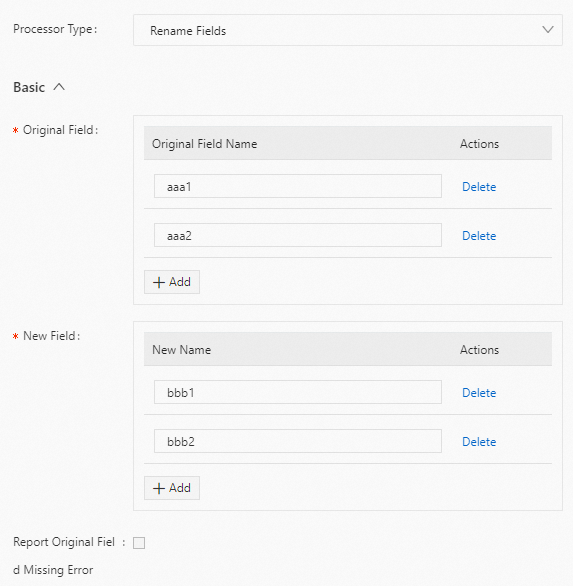
Result
"bbb1":"value1"
"bbb2":"value2"
"aaa3":"value3"
JSON configuration
Parameter settings
Set type to processor_rename. The following table describes the parameters in the detail object.
Parameter | Type | Required | Description |
NoKeyError
| Boolean | No | Specifies whether to report an error if the source field is not found in the log. |
SourceKeys
| String array | Yes | The source fields to be renamed. |
DestKeys
| String array | Yes | The new names for the fields. |
Example
Rename the aaa1 field to bbb1 and the aaa2 field to bbb2. The following is an example configuration:
Raw log
"aaa1":"value1"
"aaa2":"value2"
"aaa3":"value3"
Logtail plugin configuration
{
"processors":[
{
"type":"processor_rename",
"detail": {
"SourceKeys": ["aaa1","aaa2"],
"DestKeys": ["bbb1","bbb2"],
"NoKeyError": true
}
}
]
}
Result
"bbb1":"value1"
"bbb2":"value2"
"aaa3":"value3"
Pack fields plugin
You can use the processor_packjson plugin to pack one or more fields into a JSON object field. This section describes the parameters and provides a configuration example for the processor_packjson plugin.
Configuration
Important The processor_packjson plugin is supported in Logtail 0.16.28 and later.
Form-based configuration
Parameters
Set Processor Type to Encapsulate Fields. The following table describes the parameters.
Parameter | Description |
Original Field | The source fields to be packed. |
New Field | The field after packing. |
Retain Original Fields | If you select this option, the source fields are kept in the parsed log. |
Report Original Field Missing Error | If you select this option, an error is reported if a source field is not found in the raw log. |
Example
Pack the specified a and b fields into a JSON field named d_key. The following is an example configuration:
JSON configuration
Parameters
Set type to processor_packjson. The following table describes the parameters in detail.
Parameter | Type | Required | Description |
SourceKeys | String array | Yes | The source fields to be packed. |
DestKey | String | No | The field after packing. |
KeepSource | Boolean | No | Specifies whether to keep the source fields in the parsed log. |
AlarmIfIncomplete | Boolean | No | Specifies whether to report an error if a source field is not found in the raw log. |
Example configuration
Pack the specified a and b fields into a JSON field named d_key. The following is an example configuration:
Raw log
"a":"1"
"b":"2"
Logtail plugin configuration
{
"processors":[
{
"type":"processor_packjson",
"detail": {
"SourceKeys": ["a","b"],
"DestKey":"d_key",
"KeepSource":true,
"AlarmIfEmpty":true
}
}
]
}
Result
"a":"1"
"b":"2"
"d_key":"{\"a\":\"1\",\"b\":\"2\"}"
Expand JSON field plugin
Use the processor_json plugin to expand a JSON field. This section describes the parameters and provides an example configuration for the processor_json plugin.
Configuration
Important The processor_json plugin is supported in Logtail 0.16.28 and later.
Form-based configuration
Parameters
Set Processor Type to Expand JSON Field. The following table describes the parameters.
Parameter | Description |
Original Field | The name of the source field to expand. |
JSON Expansion Depth | The depth of the JSON expansion. The default value is 0, which indicates no limit. A value of 1 indicates the current level. |
Character to Concatenate Expanded Keys | The connector for JSON expansion. The default value is an underscore (_). |
Name Prefix of Expanded Keys | The prefix to add to the field names during JSON expansion. |
Expand Array | Specifies whether to expand array types. This parameter is available in Logtail 1.8.0 and later. |
Retain Original Field | If you select this option, the source field is kept in the parsed log. |
Report Original Field Missing Error | If you select this option, an error is reported if the source field is not found in the raw log. |
Use Name of Original Field as Name Prefix of Expanded Keys | If you select this option, the source field name is used as the prefix for all expanded JSON field names. |
Retain Raw Logs If Parsing Fails | If you select this option, the raw log is kept if parsing fails. |
Example
This example expands the s_key field. It uses j as a prefix and the source field name s_key as the prefix for the expanded field names. The following is an example configuration:
Raw log (file path read by Logtail)
{"s_key":"{\"k1\":{\"k2\":{\"k3\":{\"k4\":{\"k51\":\"51\",\"k52\":\"52\"},\"k41\":\"41\"}}}}"}
Logtail plugin configuration

Result

JSON configuration
Parameters
Set type to processor_json. The following table describes the parameters in detail.
Parameter | Type | Required | Description |
SourceKey | String | Yes | The name of the source field to be expanded. |
NoKeyError | Boolean | No | Specifies whether to report an error if the source field is not found in the raw log. |
ExpandDepth | Int | No | The depth of JSON expansion. The default value is 0, which means no limit. A value of 1 indicates the current level, and so on. |
ExpandConnector | String | No | The connector for JSON expansion. The default value is an underscore (_). |
Prefix | String | No | The prefix to add to the field names during JSON expansion. |
KeepSource | Boolean | No | Specifies whether to keep the source field in the parsed log. |
UseSourceKeyAsPrefix | Boolean | No | Specifies whether to use the source field name as the prefix for all expanded JSON field names. |
KeepSourceIfParseError | Boolean | No | Specifies whether to keep the raw log if parsing fails. |
ExpandArray | Boolean | No | Specifies whether to expand array types. This parameter is supported in Logtail 1.8.0 and later. false (default): Do not expand arrays. true: Expand arrays. For example, {"k":["1","2"]} is expanded to {"k[0]":"1","k[1]":"2"}.
|
Example
This example expands the s_key field. It uses j as a prefix and the source field name s_key as the prefix for the expanded field names. The following is an example configuration:
Raw log (file path read by Logtail)
{"s_key":"{\"k1\":{\"k2\":{\"k3\":{\"k4\":{\"k51\":\"51\",\"k52\":\"52\"},\"k41\":\"41\"}}}}"}
Logtail plugin configuration
{
"processors":[
{
"type":"processor_json",
"detail": {
"SourceKey": "content",
"NoKeyError":true,
"ExpandDepth":0,
"ExpandConnector":"-",
"Prefix":"j",
"KeepSource": false,
"UseSourceKeyAsPrefix": true
}
}
]
}
Result

Map field values plugin
The processor_dict_map plugin maps field values. This section describes its parameters and provides an example configuration.
Configuration
Form-based configuration
Set Processor Type to Field Value Mapping. The following table describes the parameters.
Parameter | Description |
Original Field | The source field name. |
New Field | The name of the mapped field. |
Mapping Dictionary | A dictionary that maps keys to values. Use this parameter to directly configure a small mapping dictionary. This avoids the need for a local CSV dictionary file.
Important The Mapping Dictionary configuration does not take effect if you set Local Dictionary. |
Local Dictionary | A dictionary file in CSV format. This file uses a comma (,) as the separator and double quotation marks (") to enclose field references. |
Process Missing Original Field | Select this option to handle cases where the source field is missing from a raw log. The system then fills the result field with the value specified in Value to Fill New Field. |
Maximum Mapping Dictionary Size | The maximum size of the mapping dictionary. The default value is 1000, which means you can store up to 1000 mapping rules. To limit the memory usage of the plugin on the server, decrease this value. |
Method to Process Raw Log | Specifies how to handle cases where the mapped field already exists in the raw log. |
JSON configuration
Set type to processor_dict_map. The following table describes the parameters for detail.
Parameter | Type | Required | Description |
SourceKey | String | Yes | The source field name. |
MapDict | Map | No | A mapping dictionary. Use this parameter to directly configure a small mapping dictionary. This avoids the need for a local CSV dictionary file.
Important The MapDict parameter does not take effect if you set the DictFilePath parameter. |
DictFilePath | String | No | A dictionary file in CSV format. This file uses a comma (,) as the separator and double quotation marks (") to enclose field references. |
DestKey | String | No | The name of the mapped field. |
HandleMissing | Boolean | No | Specifies whether to process a raw log if the target field is missing. |
Missing | String | No | The value to use for the result field when the source field is missing from the raw log. The default value is Unknown. This parameter takes effect only when you set HandleMissing to true. |
MaxDictSize | Int | No | The maximum size of the mapping dictionary. The default value is 1000, which means you can store up to 1000 mapping rules. To limit the memory usage of the plugin on the server, decrease this value. |
Mode | String | No | Specifies how to handle cases where the mapped field already exists in the raw log. |
String replacement
Use the processor_string_replace plugin to replace the full text of a log, replace text based on a regular expression, or remove escape characters.
Configuration description
Important The processor_string_replace plugin is supported in Logtail 1.6.0 and later.
Form-based configuration
Set Processor Type to String Replacement. The following table describes the parameters.
Parameter | Description |
Original Field | The name of the source field. |
Match Mode | Specifies the match method. Valid values: String Match: Replaces the target content with a string. Regex Match: Replaces the target content based on a regular expression. Remove Escape Character: Removes escape characters.
|
Matched Content | Enter the content to match. If you set Match Mode to String Match, enter the string that matches the content to replace. If multiple strings match, all are replaced. If you set Match Mode to Regex Match, enter the regular expression that matches the content to replace. If multiple strings match, all are replaced. You can also use regular expression groups to match specific groups. If you set Match Mode to Remove Escape Character, you do not need to configure this parameter.
|
Replaced By | The string to use for replacement. If you set Match Mode to String Match, enter the string to replace the original content. If you set Match Mode to Regex Match, enter the string to replace the original content. You can replace content based on regular expression groups. If you set Match Mode to Remove Escape Character, you do not need to configure this parameter.
|
New Field | Specify a new field for the replaced content. |
JSON configuration
Set the type parameter to processor_string_replace. The following table describes the parameters in the detail object.
Parameter | Type | Required | Description |
SourceKey
| String | Yes | The name of the source field. |
Method
| String | Yes | Specifies the match method. Valid values: const: Use string replacement.
regex: Use regular expression replacement.
unquote: Remove escape characters.
|
Match
| String | No | Enter the content to match. If you set Method to const, enter the string that matches the content to replace. If multiple strings match, all are replaced. If you set Method to regex, enter the regular expression that matches the content to replace. If multiple strings match, all are replaced. You can also use regular expression groups to match specific groups. If you set Method to unquote, you do not need to configure this parameter.
|
ReplaceString
| String | No | The string to use for replacement. The default value is "". If you set Method to const, enter the string to replace the original content. If you set Method to regex, enter the string to replace the original content. You can replace content based on regular expression groups. If you set Method to unquote, you do not need to configure this parameter.
|
DestKey
| String | No | Specify a new field for the replaced content. If you do not specify this parameter, no new field is created. |
Configuration examples
Replace content using string match
Use a string match to replace Error: in the content field with an empty string.
Form-based configuration
Raw log:
"content": "2023-05-20 10:01:23 Error: Unable to connect to database."
Logtail plugin configuration:
Result:
"content": "2023-05-20 10:01:23 Unable to connect to database."
JSON configuration
Raw log:
"content": "2023-05-20 10:01:23 Error: Unable to connect to database."
Logtail plugin configuration:
{
"processors":[
{
"type":"processor_string_replace",
"detail": {
"SourceKey": "content",
"Method": "const",
"Match": "Error: ",
"ReplaceString": ""
}
}
]
}
Result:
"content": "2023-05-20 10:01:23 Unable to connect to database.",
Replace content using a regular expression
Use a regular expression to replace strings in the content field that match the regular expression \\u\w+\[\d{1,3};*\d{1,3}m|N/A with an empty string.
Form-based configuration
Raw log:
"content": "2022-09-16 09:03:31.013 \u001b[32mINFO \u001b[0;39m \u001b[34m[TID: N/A]\u001b[0;39m [\u001b[35mThread-30\u001b[0;39m] \u001b[36mc.s.govern.polygonsync.job.BlockTask\u001b[0;39m : Block collection------end------\r"
Logtail plugin configuration:
Result:
"content": "2022-09-16 09:03:31.013 INFO [TID: ] [Thread-30] c.s.govern.polygonsync.job.BlockTask : Block collection------end------\r",
JSON configuration
Raw log:
"content": "2022-09-16 09:03:31.013 \u001b[32mINFO \u001b[0;39m \u001b[34m[TID: N/A]\u001b[0;39m [\u001b[35mThread-30\u001b[0;39m] \u001b[36mc.s.govern.polygonsync.job.BlockTask\u001b[0;39m : Block collection------end------\r"
Logtail plugin configuration:
{
"processors":[
{
"type":"processor_string_replace",
"detail": {
"SourceKey": "content",
"Method": "regex",
"Match": "\\\\u\\w+\\[\\d{1,3};*\\d{1,3}m|N/A",
"ReplaceString": ""
}
}
]
}
Result:
"content": "2022-09-16 09:03:31.013 INFO [TID: ] [Thread-30] c.s.govern.polygonsync.job.BlockTask : Block collection------end------\r",
Replace content using regular expression groups
Use regular expression groups to replace 16 in the content field with */24 and write the result to a new field named new_ip.
Important When you replace content using regular expression groups, the replacement string cannot contain {}. You can use only formats such as $1 and $2.
Form-based configuration
Raw log:
"content": "10.10.239.16"
Logtail plugin configuration:
Result:
"content": "10.10.239.16",
"new_ip": "10.10.239.*/24",
JSON configuration
Raw log:
"content": "10.10.239.16"
Logtail plugin configuration:
{
"processors":[
{
"type":"processor_string_replace",
"detail": {
"SourceKey": "content",
"Method": "regex",
"Match": "(\\d.*\\.)\\d+",
"ReplaceString": "$1*/24",
"DestKey": "new_ip"
}
}
]
}
Result:
"content": "10.10.239.16",
"new_ip": "10.10.239.*/24",
Remove escape characters
Form-based configuration
Raw log:
"content": "{\\x22UNAME\\x22:\\x22\\x22,\\x22GID\\x22:\\x22\\x22,\\x22PAID\\x22:\\x22\\x22,\\x22UUID\\x22:\\x22\\x22,\\x22STARTTIME\\x22:\\x22\\x22,\\x22ENDTIME\\x22:\\x22\\x22,\\x22UID\\x22:\\x222154212790\\x22,\\x22page_num\\x22:1,\\x22page_size\\x22:10}"
Logtail plugin configuration:
Result:
"content": "{\"UNAME\":\"\",\"GID\":\"\",\"PAID\":\"\",\"UUID\":\"\",\"STARTTIME\":\"\",\"ENDTIME\":\"\",\"UID\":\"2154212790\",\"page_num\":1,\"page_size\":10}",
JSON configuration
Raw log:
"content": "{\\x22UNAME\\x22:\\x22\\x22,\\x22GID\\x22:\\x22\\x22,\\x22PAID\\x22:\\x22\\x22,\\x22UUID\\x22:\\x22\\x22,\\x22STARTTIME\\x22:\\x22\\x22,\\x22ENDTIME\\x22:\\x22\\x22,\\x22UID\\x22:\\x222154212790\\x22,\\x22page_num\\x22:1,\\x22page_size\\x22:10}"
Logtail plugin configuration:
{
"processors":[
{
"type":"processor_string_replace",
"detail": {
"SourceKey": "content",
"Method": "unquote"
}
}
]
}
Result:
"content": "{\"UNAME\":\"\",\"GID\":\"\",\"PAID\":\"\",\"UUID\":\"\",\"STARTTIME\":\"\",\"ENDTIME\":\"\",\"UID\":\"2154212790\",\"page_num\":1,\"page_size\":10}",
